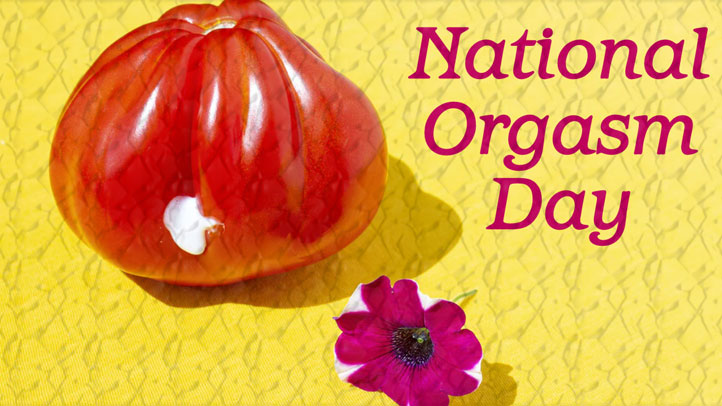Reasons to Celebrate National Orgasm Day

National Orgasm Day, a day to truly celebrate one of life's most pleasurable experiences, invites us to delve into its history and purpose. Beyond just celebrating orgasms, it's a day dedicated to fostering a healthier, open dialogue around sexual pleasure.
Although the exact origins of National Orgasm Day are a bit mysterious, it's generally agreed that the festivities began in the early 2000s. The day lands in the heart of summer, a season synonymous with joy, liberation, and sensuality!
The goal of National Orgasm Day goes beyond just encouraging pleasure. It's about breaking taboos, sparking honest conversations about sexual health, and highlighting the importance of consent and communication in our sexual relationships. It's a day to challenge the norms that stifle sexual expression and cherish the beauty of our sexual experiences.
Over the years, National Orgasm Day has spotlighted the orgasm gap—the difference in orgasm frequency between different genders in heterosexual encounters—and it has amplified the call for more comprehensive sex education. This day has led to petitions, initiatives, and campaigns for change, turning the global spotlight on the importance of pleasure and satisfaction in our sexual lives.
National Orgasm Day isn't just about experiencing orgasms; it's a day to educate ourselves about sexual health, practice open communication with our partners about our sexual needs and desires, and foster a deeper understanding of sexual pleasure. Essentially, it's about embracing our sexuality, respecting and celebrating others, and promoting a healthier, more joyous approach to sex.
As we celebrate National Orgasm Day, let's remember its significance in promoting healthier and more inclusive discussions around sexual pleasure. It's not just a day but a movement towards a society that respects and cherishes our sexual selves.
Now that we know the history, let’s discuss some misconceptions and learn more about the intriguing, complex phenomenon known as the orgasm. Fully understanding our orgasmic experiences and embracing them as an integral part of our sexuality is not only liberating, but it also sets the stage for enriched sexual health and satisfaction.
At the heart of sexual pleasure is the orgasm, often perceived as the climax or the crescendo of sexual excitement. The feeling is accompanied by a series of rhythmic contractions in the pelvic region and a rush of euphoric sensations. It's not just about procreation - orgasms are vital to our holistic health, contributing significantly to our physical and mental well-being. They're not simply an indulgence but an essential ingredient of human health.
The diverse ways humans experience orgasms are as intriguing as they are misunderstood, leading to the spreading of numerous myths. One of the most common myths is that all humans with a vagina can, or indeed should, achieve orgasm through penetrative sex alone. However, this is a gross misrepresentation of the sexual experience for someone with a vagina. Debby Herbenick's groundbreaking study found that only about 18% of women can reach orgasm through penetration alone. Most people assigned female at birth and/or have a vagina require some form of clitoral stimulation to reach orgasm.
Another widely circulated misconception is that all genders' orgasms are mirror images of each other. However, this couldn't be further from the truth. Orgasms can vary significantly in terms of duration, intensity, and even the subjective feelings they evoke, and these differences can be attributed to both biological and psychological factors. Each person’s orgasmic experience is as unique as their fingerprint, adding to the wonderfully varied landscape of sexual experiences.
Another myth we must shatter is that difficulties in achieving orgasm, known as anorgasmia, are purely psychological. It's true that mental factors, such as stress or anxiety, or even distraction, can play a part. However, physical health conditions, certain medications, and hormonal changes can also contribute to anorgasmia. A comprehensive review in the Journal of Sexual Medicine found that various factors, including medical conditions, psychological issues, and certain types of medication, could cause anorgasmia.
Busting these myths and promoting a fact-based understanding of orgasms can foster better sexual health and satisfaction. This knowledge can improve communication in relationships, promoting mutual understanding and respect for individual sexual experiences. It also encourages self-love and acceptance as individuals learn to understand and embrace their unique ways of experiencing pleasure.
As we mark National Orgasm Day, let's commit to promoting a dialogue that uplifts, informs, and empowers all aspects of our sexual selves. Let's celebrate the beauty of our orgasms - in all their glorious diversity - and acknowledge their importance in many of our lives. National Orgasm Day is about more than just orgasms; it's about embracing our sexuality, breaking down misconceptions, and continuing our quest for a sexually healthy and satisfying life.
Try Zumio
Zumio Sadie
Zumio Ethel
Zumio Xena
Zumio Iyana
Own Your Orgasm
Zumio’s clitoral stimulator has patented SpiroTip™ rotation technology that lets you pinpoint your exact pleasure spots for the most satisfying orgasm imaginable.
Experience it for yourself!





